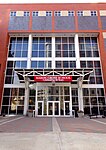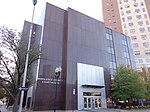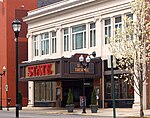New Brunswick Free Public Library
Beaux-Arts architecture in New JerseyBuildings and structures in New Brunswick, New JerseyCarnegie libraries in New JerseyHistoric district contributing properties in New JerseyLibrary buildings completed in 1903 ... and 3 more
NRHP infobox with nocatNational Register of Historic Places in Middlesex County, New JerseyTourist attractions in New Brunswick, New Jersey

The New Brunswick Free Public Library is the public library of New Brunswick, New Jersey. The main library, built 1903, is located at 60 Livingston Avenue and is one of New Jersey's Carnegie libraries. The Henry Guest House was moved to library grounds in 1924 and is bordered by the Willow Grove Cemetery. It is a contributing property of the Livingston Avenue Historic District. The library is the only building with Beaux Arts style in the district.
Excerpt from the Wikipedia article New Brunswick Free Public Library (License: CC BY-SA 3.0, Authors, Images).New Brunswick Free Public Library
Livingston Avenue, New Brunswick
Geographical coordinates (GPS) Address Phone number Website External links Nearby Places Show on map
Geographical coordinates (GPS)
| Latitude | Longitude |
|---|---|
| N 40.491388888889 ° | E -74.445833333333 ° |
Address
New Brunswick Free Public Library
Livingston Avenue 60
08901 New Brunswick
New Jersey, United States
Open on Google Maps








